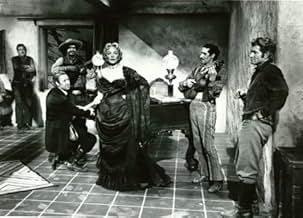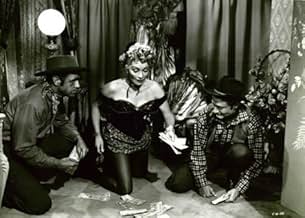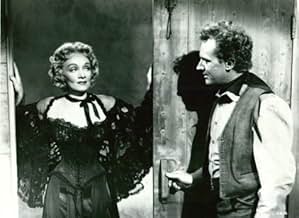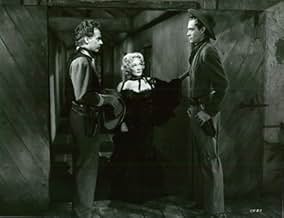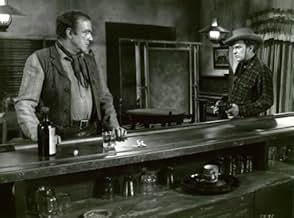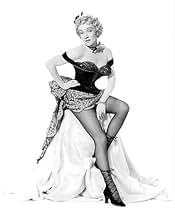IMDb RATING
6.8/10
5.9K
YOUR RATING
After the murder of his fiancée, a Wyoming ranch hand sets out to find her killer.After the murder of his fiancée, a Wyoming ranch hand sets out to find her killer.After the murder of his fiancée, a Wyoming ranch hand sets out to find her killer.
- Director
- Writers
- Stars
Rodd Redwing
- Rio
- (as Rodric Redwing)
Victor Adamson
- Racer with Fat Girl
- (uncredited)
Roger Anderson
- Red
- (uncredited)
Al Bain
- Race Spectator
- (uncredited)
Ray Beltram
- Barfly
- (uncredited)
- Director
- Writers
- All cast & crew
- Production, box office & more at IMDbPro
Featured reviews
I've heard RN called underrated and under appreciated and I can see why. It's not the best or perfect but it's different from most. The story is lean but heavy in undertones and gives it weight and moves along well.
When I was in school not too many years after this film came out, as I recall vividly, we were taught the evils of totalitarianism (notably of the Communist variety). One of the scariest evils, so we were told, was that people could be made not to exist - not just in the sense of being murdered, but in the sense of being erased even in memory. They did not exist. And they had never existed, even if they had. History books were doctored. Names were whited out of the index. The memory of history changed. That was the great difference between us and them. It could never happen here. We all, patriotic little kids, nodded - not here. Watch this movie and you will see it happen, here. All the characters are played by actors. All except one. One is played by a phantom. He doesn't exist. Of course, he does. He's Lloyd Gough. His character, Kinch, is the central pivot of the entire story, from the first scene. But he has been removed from the cast: no mention of his name.
Lloyd Gough and his wife Karen Morley refused to grovel before HUAC and so were blacklisted. He was also erased, retroactively. They couldn't erase his image, because he was in too many and too important scenes. But they could erase his memory. That they did. They didn't blot out his name from the many other films he had played. But they could have. Why not? It's only a short step from one retroactive erasure to many. Not too hard to reshoot the credits of old films. is it? Didn't happen. But it started. Think about that and be scared. Oh, yes, I forgot. We're past that now, just an aberration of the 1950s. Right?
Lloyd Gough and his wife Karen Morley refused to grovel before HUAC and so were blacklisted. He was also erased, retroactively. They couldn't erase his image, because he was in too many and too important scenes. But they could erase his memory. That they did. They didn't blot out his name from the many other films he had played. But they could have. Why not? It's only a short step from one retroactive erasure to many. Not too hard to reshoot the credits of old films. is it? Didn't happen. But it started. Think about that and be scared. Oh, yes, I forgot. We're past that now, just an aberration of the 1950s. Right?
When his fiancé Beth is raped and murdered during a robbery, peace-loving rancher Vern Haskell sets out to track down the man that did it. Driven by a desire for revenge more than justice, Haskell follows the trail to a casino and bordello called Chuck-A-Luck. Here he follows his leads to Alter Keane and gunslinger French Fairmont; they take him onto their staff at their horse ranch and gang HQ and Haskell hopes to use his cover to get his closer to finding out who it was that raped his girl. However in keeping his cover, Haskell finds himself drawn into their world more and more.
The staples of westerns of the period are all here revenge, Technicolor, songs and romance; however this film opens with a rape (and it is fairly obvious that it was a violent rape) and a nice man who descents into violent anger. In a way the film makes this its central theme but it doesn't continue in this very strong vein and softens it somewhat with the addition of romance and musical interludes. From here on in it is still enjoyable but never marks itself out as more than a solid genre western; the complexities that I had hoped would consume him were not to be found in Haskell to any great degree. Despite this the plot still works well enough to engage and the gruff pace avoids sentimentality and makes the tough romance easier to swallow in context. The action is roundly enjoyable and Lang directs well within the sets, providing some good shots that stick in the mind.
The cast are mixed but generally meet the standard required of them. Dietrich may have demanded she be made to look as young as possible but her age helps stand her apart from the usual love interest actresses. She is tough and enjoyable in her role but I could have done without the songs. Kennedy is reasonably good but not too comfortable with his character he is either a white knight or a gurning ball of rage; subtlety is not his key word. Ferrer is lively and fun and makes more of his character than the genre usually allows the "other man" character to do. Support from Elam, Reeves and others is all solid enough to make it work.
So an enjoyable genre western then but a bit disappointing for throttling back after such a tough start. The standard revenge plot is made more interesting by the change in Haskell but it could have been better; meanwhile the usual action, songs and romance all work pretty well and will easily please genre fans.
The staples of westerns of the period are all here revenge, Technicolor, songs and romance; however this film opens with a rape (and it is fairly obvious that it was a violent rape) and a nice man who descents into violent anger. In a way the film makes this its central theme but it doesn't continue in this very strong vein and softens it somewhat with the addition of romance and musical interludes. From here on in it is still enjoyable but never marks itself out as more than a solid genre western; the complexities that I had hoped would consume him were not to be found in Haskell to any great degree. Despite this the plot still works well enough to engage and the gruff pace avoids sentimentality and makes the tough romance easier to swallow in context. The action is roundly enjoyable and Lang directs well within the sets, providing some good shots that stick in the mind.
The cast are mixed but generally meet the standard required of them. Dietrich may have demanded she be made to look as young as possible but her age helps stand her apart from the usual love interest actresses. She is tough and enjoyable in her role but I could have done without the songs. Kennedy is reasonably good but not too comfortable with his character he is either a white knight or a gurning ball of rage; subtlety is not his key word. Ferrer is lively and fun and makes more of his character than the genre usually allows the "other man" character to do. Support from Elam, Reeves and others is all solid enough to make it work.
So an enjoyable genre western then but a bit disappointing for throttling back after such a tough start. The standard revenge plot is made more interesting by the change in Haskell but it could have been better; meanwhile the usual action, songs and romance all work pretty well and will easily please genre fans.
With it being directed by the great Fritz Lang (a director with a great and distinctively Expressionistic visual and directing style, with 'M' and 'Metropolis' being two of the finest examples) and starring Marlene Dietrich (especially fond of her work with Josef von Sternberg and in 'Witness for the Prosecution'), 'Rancho Notorious' had a lot of interest value. Likewise with the story idea.
'Rancho Notorious' may not be my idea of a great film, especially for one with such a great director and an actress as talented as Dietrich. This is not to say that 'Rancho Notorious' is bad. It is far from that. While it is problematic and far from being one of Lang's best, in a way it's somewhat of a lesser effort, to me it was quite good and an interesting take on the genre. Strange and over-the-top but on the most part it's not in a bad way.
Its weak point is the main theme/song. It is used far too much, like over-explanatory narration in song form, and the actual theme is grating and heavy-handed. Didn't even think it fitted much stylistically either (sounding too jaunty for a film that started off in a gritty fashion) and the cheesiness of some of the words added to the out of kilter feel. Seeing as it features heavily, it was a big problem and made me not think highly of the music much.
The film is cheap-looking in the sets, which never look authentic and more hastily-made studio-bound settings that look like they were constructed on the remainder of a budget where most of it was blown hiring Lang and Dietrich. Arthur Kennedy's performance is slightly uneven, mostly he's fine but in the more romantic parts he looks uncomfortable and more chemistry (though it's there) with Dietrich would have been welcome.
Dietrich however, even when past prime, looks luminous and brings the right amount of charisma and toughness. Something that Kennedy also displays in his best moments. A relatively cast against type Mel Ferrer is lively support and George Reeves and Jack Elam are just as solid. Lang himself fares very well here, his direction is stylish and moody with some nice creative touches.
Also found 'Rancho Notorious' to boast some ravishingly striking cinematography. The rest of the songs are nicely sung and are placed and used better, even if one questions the necessity. The film gets off to a wonderfully gritty start that one does wish was carried further, though the over-the-top-ness was actually entertaining still and didn't jar as much as it sounds. The tension simmers beautifully and the climax scintillates, the lack of sentimentality was appreciated.
Summing up, intriguing, for Lang completests and to see how a different take on a Western can fare, and well done though Lang did much better. 7/10 Bethany Cox
'Rancho Notorious' may not be my idea of a great film, especially for one with such a great director and an actress as talented as Dietrich. This is not to say that 'Rancho Notorious' is bad. It is far from that. While it is problematic and far from being one of Lang's best, in a way it's somewhat of a lesser effort, to me it was quite good and an interesting take on the genre. Strange and over-the-top but on the most part it's not in a bad way.
Its weak point is the main theme/song. It is used far too much, like over-explanatory narration in song form, and the actual theme is grating and heavy-handed. Didn't even think it fitted much stylistically either (sounding too jaunty for a film that started off in a gritty fashion) and the cheesiness of some of the words added to the out of kilter feel. Seeing as it features heavily, it was a big problem and made me not think highly of the music much.
The film is cheap-looking in the sets, which never look authentic and more hastily-made studio-bound settings that look like they were constructed on the remainder of a budget where most of it was blown hiring Lang and Dietrich. Arthur Kennedy's performance is slightly uneven, mostly he's fine but in the more romantic parts he looks uncomfortable and more chemistry (though it's there) with Dietrich would have been welcome.
Dietrich however, even when past prime, looks luminous and brings the right amount of charisma and toughness. Something that Kennedy also displays in his best moments. A relatively cast against type Mel Ferrer is lively support and George Reeves and Jack Elam are just as solid. Lang himself fares very well here, his direction is stylish and moody with some nice creative touches.
Also found 'Rancho Notorious' to boast some ravishingly striking cinematography. The rest of the songs are nicely sung and are placed and used better, even if one questions the necessity. The film gets off to a wonderfully gritty start that one does wish was carried further, though the over-the-top-ness was actually entertaining still and didn't jar as much as it sounds. The tension simmers beautifully and the climax scintillates, the lack of sentimentality was appreciated.
Summing up, intriguing, for Lang completests and to see how a different take on a Western can fare, and well done though Lang did much better. 7/10 Bethany Cox
"Rancho Notorious" is a beautifully atmospheric and suspenseful film. Best known for his expressionist black & white suspense thrillers, director Fritz Lang brings the same qualities to this Technicolor western.
Although she must have been in her fifties when the film was made, Dietrich looks absolutely gorgeous. She also seems to be having lots of fun with the part, in a sense reprising her character from "Destry Rides Again." It's never explained how this woman with the strange German accent ended up in the Wild West, and we don't really care. By the way, Dietrich's performance in these two films was the basis for Madeline Kahn's great parody in "Blazing Saddles."
The one thing that really stands out in my mind about this film is how effectively the suspense builds. The tension leading up to Vern's discovery of the killer's identity is almost unbearable, and Lang makes us wait until the film's last five minutes for the inevitable score-settling gunfight.
In a period of film history when westerns were a dime a dozen, this one really stands out as a true classic.
Although she must have been in her fifties when the film was made, Dietrich looks absolutely gorgeous. She also seems to be having lots of fun with the part, in a sense reprising her character from "Destry Rides Again." It's never explained how this woman with the strange German accent ended up in the Wild West, and we don't really care. By the way, Dietrich's performance in these two films was the basis for Madeline Kahn's great parody in "Blazing Saddles."
The one thing that really stands out in my mind about this film is how effectively the suspense builds. The tension leading up to Vern's discovery of the killer's identity is almost unbearable, and Lang makes us wait until the film's last five minutes for the inevitable score-settling gunfight.
In a period of film history when westerns were a dime a dozen, this one really stands out as a true classic.
Did you know
- TriviaCinematographer Hal Mohr, who had previously photographed Marlene Dietrich in Femme ou démon (1939), attempted to resign from the film because of 50-year-old Dietrich's insistence that he use lighting to make her look much younger than she actually was, and Mohr didn't think it was possible.
- GoofsWhen Haskell and Fairmont are in the cell and talking about gambling, one of them refers to a Chuck-a-Luck "Wheel". There is no wheel in Chuck-a-Luck. Chuck-a-Luck is a dice game played with (two or) three dice often contained in an hour-glass shaped rotatable cage. Bets are placed as to what number will come up on gaming table. The game played in the film involves a wheel with pegs in between representations of all the possible 3-dice rolls, which is the wheel that is both talked and sung about. This is a variation on the original game called Big Six Wheel. Because of the distribution of the combinations, the house advantage or edge for this wheel is greater than for Chuck-a-Luck.
- Quotes
Altar Keane: [to Vern] I'd wish you go away... and come back ten years ago.
- Crazy creditsAs the title song plays and Bill Lee sings the lyric "... and a man of steel ..." there are eleven names of supporting actors on screen, and the name in the central position is George Reeves, soon to be cast as The Man of Steel in *The Adventures of Superman* (1952-58).
- ConnectionsEdited into Histoire(s) du cinéma: Fatale beauté (1994)
- How long is Rancho Notorious?Powered by Alexa
Details
Box office
- Budget
- $900,000 (estimated)
- Gross worldwide
- $63
- Runtime
- 1h 29m(89 min)
- Color
- Aspect ratio
- 1.37 : 1
Contribute to this page
Suggest an edit or add missing content

